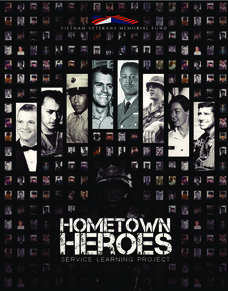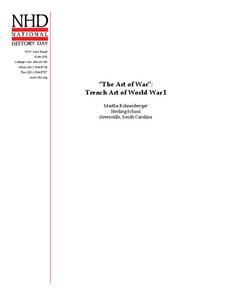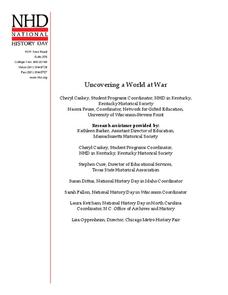Constitutional Rights Foundation
If Men Were Angels: Teaching the Constitution With the Federalist Papers
Much like the methods of group work, the writers of the Federalist Papers worked together to advocate for their viewpoints against the anti-federalists. The resource enables learners to break into small groups and conduct research before...
Smithsonian Institution
Students’ Response to 9/11—A Documentary Report
Young historians research the devastating attacks of 9/11 and use that information to script their own documentaries. The follow-up activity includes recording the documentary and conducting classmate interviews,
Smithsonian Institution
The Soldier’s Experience—Vietnam versus World War I
The Vietnam War and World War I were two very important—and different—wars. To understand the differences, and similarities, class members watch videos, examine primary source documents, and then create a newscast that examines the...
Federal Reserve Bank
The Story of the Federal Reserve: Middle School Lesson Plan
After reading the charming cartoon about the United States Federal Reserve, pupils often need to complete activities to retain their learning. The resource does a wonderful job of using class discussion and various written exercises to...
Vietnam Veterans Memorial Fund
Hometown Heroes
Transform studying about veterans in a textbook to personal interviews with veterans in the community. Four varying lesson plans make up an entire unit or individualized learning based on your class's needs. Exercises include researching...
Montana State University
Sea Floor to Summit
Who knew that mountain formation could be so entertaining? Leanr how mountains form with a resource on Mount Everest. Activities to guide learning include a simulation, project, videos, coloring activities, and worksheets.
Montana State University
What's the Weather?
How many jackets do you need to stay warm and climb Mount Everest? An informatie resource covers the topic of Mount Everest, the resource helps young scientists discover the difference between climate and weather. Activities include...
PBS
Women's History: Parading Through History
Want to teach your pupils about debate, effective speech techniques, propaganda, and the women's movement? The first in a sequential series of three, scholars analyze real propaganda images from the the historic women's movement, view a...
Roald Dahl
Charlie and the Chocolate Factory
The Charlie and the Chocolate Factory unit is a golden ticket for teachers looking for nicely written plans. Elementary and middle schoolers draw their impressions of characters, design and market their own candy creations, and use...
National History Day
Helping Life and Aiding Death: Science, Technology, and Engineering at Work during World War I
Science, engineering, and United States history? Pupils research collections of artifacts from the Smithsonian to learn about historical scientific innovations. At the end of the lesson, they write an essay to discuss technology's...
National History Day
“The Art of War”: Trench Art of World War I
Teach pupils how veterans used art to deal with PTSD and shell-shock from trench warfare during World War I. Scholars use graphic organizers, a cartoon analysis sheet, and their own inferences to analyze primary source art work by veterans.
PBS
NOVA Sun Lab Lesson Plan
Looking for a sun-sational multi-lesson plan full of videos, simulations, and discussion? Introduce your young scientists to all things solar with a four-part hands-on adventure. Pupils learn the basics of solar anatomy, space weather,...
US Institute of Peace
Identifying Conflict Styles
Are you a peace-keeper or a problem-solver? Explore conflict management styles through a instructional activity, fourth in a 15-part series, that combines individual assessment and collaborative work. Groups learn the basic tendencies of...
National History Day
Uncovering a World at War
Has media always had an influence on public policy? After researching and reading news articles written during World War I, learners understand the influence of communication and media. They discuss articles in small groups and as a...
National History Day
World War I Propaganda: Targeting all Americans to Join the War Effort
Is propaganda from World War I any different than the propaganda of today? Class members learn about the effectiveness of advertising and its influence on American's behavior. Activities include a propaganda think sheet, assessments of...
American Press Institute
Introductory News Literacy
Aspiring journalists learn about media literacy, journalism, and the press. Units come complete with handouts, assignment rubrics, notes, and extension suggestions. Each unit also comes with a list of vocabulary words and learning...
National Endowment for the Humanities
People and Places in the North and South
North and South: two opposite directions and two opposite economic and social systems in time of the Civil War. Pupils peruse census websites and primary source photographs to understand what life was like for the everyday person before...
Scholastic
A Reading Guide to A Wrinkle in Time
Accompany a reading of Madeleine L'Engle's classic tale, A Wrinkle in Time, with a detailed guide equipped with 15 informative and useful chapters. Scholars discover who the author is, why she wrote the book, and crucial story elements...
Broward County Schools
Women's Contributions to the United States
Betsy Ross, Toni Morrison, Sacajawea, Amelia Earhart, Maya Lin, Sally Ride, Judy Baca. No matter the subject area or the grade level you teach you will find much to value in a manual that focuses on the contributions U.S. women have...
Science 4 Inquiry
States and Phases of Matter
Plasma is the most common phase of matter in our universe. Scholars explore the change of energy as molecules change phases of matter. They rotate through stations, graphing the changes in energy level.
Science 4 Inquiry
Maintaining Mass
Can you disprove the law of conservation of mass? Pupils observe the teacher weigh each part of a reaction. Then, the teacher weighs the result of the reaction and everyone sees that the products do not equal the reactants. Then they...
Science 4 Inquiry
Trick or Science: Catching the Light
Your class might be surprised to learn that mirrors have been around since the first century AD! Young scientists explore reflection and refraction of light through a series of challenges. They use this knowledge to design their own...
Science 4 Inquiry
Musical Vibes with Palm Pipes
Ancient people used musical pipes as early as the third millennium BCE. Young scientists explore the workings of musical pipes to better understand the relationship with frequency, length of pipe, and sound waves. They determine the...
Science 4 Inquiry
Frenemies, Bros and Killers: A Lesson in Symbiosis
Animals and plants develop relationships and rely on each other to survive. Pupils learn more about symbiosis through a video, a hands-on matching activity, and a game. They differentiate and describe each type on a written evaluation.

























